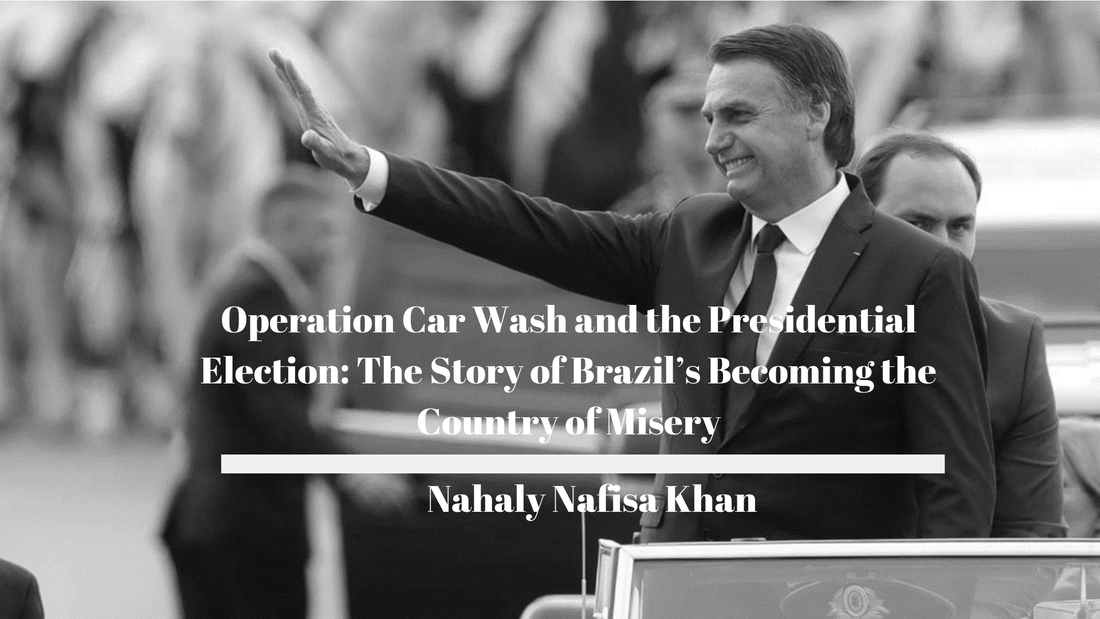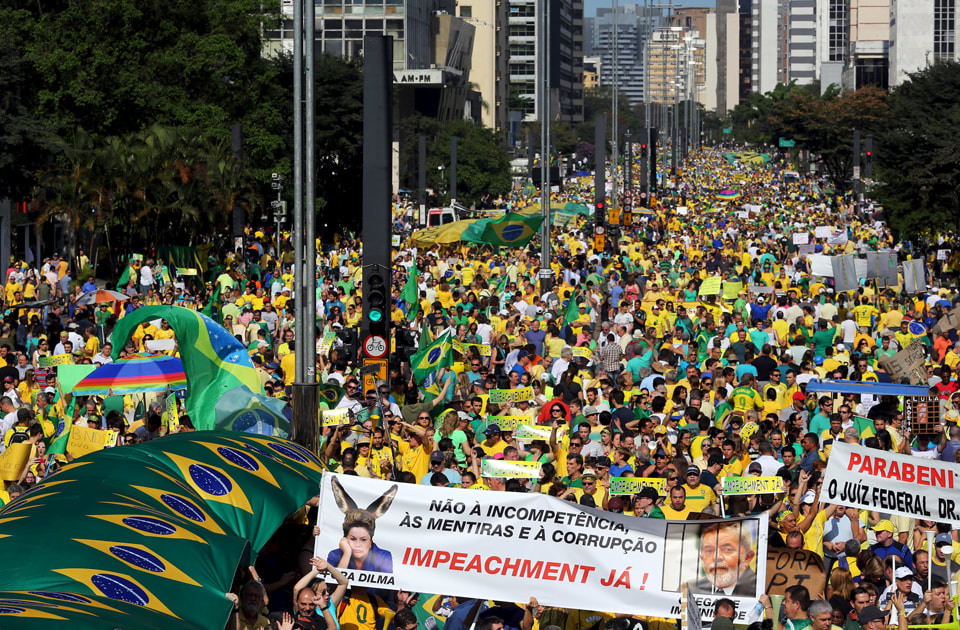ECONOMICS STUDY CENTER, UNIVERSITY OF DHAKA
|
Nahaly Nafisa Khan Right now we are witnessing an authoritarian wave of trend in politics and economy all around the world. The current governments in Hungary, Poland, Turkey, Philippines provide ample empirical evidence to this statement. But the results of Brazil’s Presidential election has come of somewhat as a wake-up call for people all across the globe to take time to think about the crisis that the humankind is going to face in near future, if this ultra-rightist trend continues. Brazil has elected an outrageously misogynistic, homophobic and someone who is devoid of any basic human values as the President of the country. In last year’s Presidential election, Jair Messias Bolsonaro, an ultra right conservative has been elected with a landslide victory. This occurrence is surprising and alarming at the same time for a country like Brazil, a country in Latin America with an inclusive and diversified rich culture to elect a President that refers to refugees as “scums of the world”, is an outright defender of torture, says climate change is a propaganda and wants to pull out of the Paris Agreement, openly supports genocides, mass murders and dictatorship and shows utter disrespect to the minorities, women and the LGBT community. Bolsonaro somehow pledges to take Brazil fifty years back, when the country was under a military dictatorship. He promises the country a new era- a return to a time free of doubts and insecurities and when certain ideas about a man’s role and a woman’s role prevailed in the public sphere and in the family. This ultra-conservatism makes him somewhat even worse than the US President Donald Trump, as many people suggest. But what triggered the mass people to go for this absolute disgrace of a President? The country was doing well under the rule of President Luiz inacio Lula da Silva. But in 2014, Lula da Silva faced severe charges of corruption and went to prison to serve for 12 years. His successor, Dilma Rousseff was impeached facing somewhat the same charges. All of these came into light after the Operation Car Wash scandal. But what was it all about? Let’s go back a few years. Comperj was the biggest petrochemical complex project which was launched in 2008 and was to open in 2011. It was located in Itaborai, a small city in the state of Rio de Janeiro. The launching of this project was an apparent blessing for this town. It promised 200,000 direct or indirect jobs to the people. Hence, it became a boomtown. In 2010 alone, 50,000 people moved there and about 160 new businesses were initiated. It was all going too well. But greater peril waited ahead. In 2012, a gas station in Brasilia, about 1200 km away from Itaborai was under surveillance for suspicion of money laundering. Illegal cash was brought in there and funneled to different people as gas station money. This cycle made this huge sum of money very hard to trace back. Alberto Youssef, one of the most influential chiefs among the money laundering clans, was arrested in the course of events. He was offered a plea deal in exchange of exposing everyone involved with this laundering. His testimony, however, made things to take quite an unexpected turn. He testified that he laundered money for top executives of Petrobas- the state owned oil company (the largest in Latin America) who also owned Comperj. An extremely shocking exposure occurred though Operation Car Wash. Further investigation revealed the Comperj project as the centre of an intricate corruption scheme. Here’s how the entire project worked. Tenders would be called out for the different tasks regarding the construction job of the complex. There would be different engineering firms competing, or as we say, bidding, to get hold of the tenders. The entire process was supposed to be based on pure competition. But that didn’t happen. What happened was a cartel, an agreement between different firms to fix the prices and take the contracts in turn. Forming a cartel was illegal in the first place, but that is the least illegal thing that happened in the entire process. Oderbrecht, being the most powerful engineering firm in the cartel, made the most profits by overcharging. Where the original estimated cost of the project was $6 billion, by 2015, $14 billion was already paid, thanks to the cartel, and mostly to Oderbrecht. The money went around through laundering, disguised as gas station money. State Governor Sergio Cabral alone, received $800,000. This money became an important funding source in the re-election campaigns. Two dozen executives were initially arrested as the result of Operation Car Wash. Two presidents were impeached back to back. Petrobas lost half of its stock value between September 2014 and January 2015. 13,000 workers were laid off when the construction works stopped in 2015. By 2016, 11 projects were brought to an abrupt stop in the country after the investigations in Operation Car Wash. Present data suggests that about 40,000 people signed up for the city’s employment program, most of them previously worked in the Comperj project. The country went into a recession as a consequence. As the people are constantly fighting this recession, after over 4 years of the Operation Car Wash scandal, the unemployment in Brazil is still high. People of Brazil are struggling to meet the bare minimum. They have come to a point where they have lost faith in their politicians. It truly has turned into a country of misery. But the desperation of the common people has brought a havoc with devastating consequences upon their own country by electing Bolsonaro as the President. Driven into despair, the majority of the people have come to the point where they see no alternative other than electing this extremely racist man as their President. This newly elected President has already initiated severe trouble, not only for the people of Brazil, but for the people across the world. In his first week of office alone, he took policies that would worsen the climate crisis at top speed. In his first days of power, the President shifted responsibility to the agriculture ministry, for demarcation of indigenous and Quilombola territory- which makes up a large part of the protected Amazon. This government sector is controlled by agribusiness, responsible for much of deforestation and eager to get their hands on the remaining forests. Bolsonaro promised to turn the public land occupied by the indigenous people into private lands where mining and agribusiness concerns can reap profits. The goal is to make more forest land available for capitalist speculation: cattle, soybeans, mining and major construction projects, all while neglecting the interests of the indigenous community. This is the reason behind the government preaching the fabricated idea about the supposed “international Marxist plot”. This fabrication will serve to justify turning the forests into a commodity. In this fantasy, indigenous people, who are the main obstacle to the destruction of the Amazon, are portrayed as “threats to the national sovereignty”. By promising to free Brazil from what he calls “political correctness”, Bolsonaro actually promises to break the chains that make people show the minimum portion of respect that should be showed towards the minorities. Let’s see what his future policies have in store for the people. Sources: https://www.bbc.com/news/world-latin-america-35810578?fbclid=IwAR0PAto3HxTLDs_huQym1kk2UzSZYh3s1SimwUJkMwwGsyRTC87DKaw11IA https://www.britannica.com/event/Petrobras-scandal https://www.youtube.com/watch?v=FsZ3p9gOkpY&fbclid=IwAR2baHx8qO6VXwndrqBg88lhR9w_SBvt9piAZgYQf26B87_yM3IOYDvTPBc https://www.theguardian.com/commentisfree/2019/jan/10/jair-bolsonaro-brazil-minorities-rainforest
0 Comments
Leave a Reply. |
Send your articles to: |





